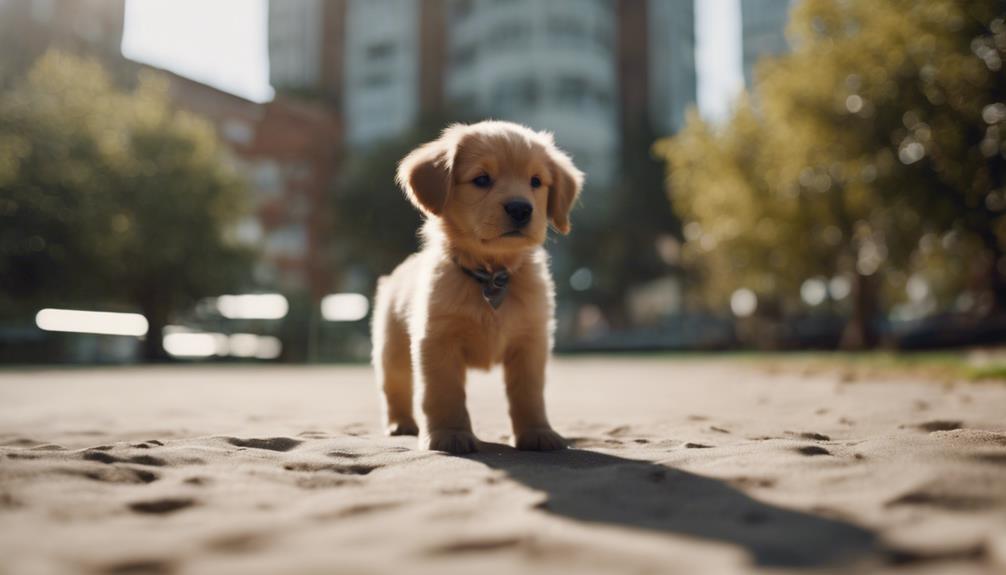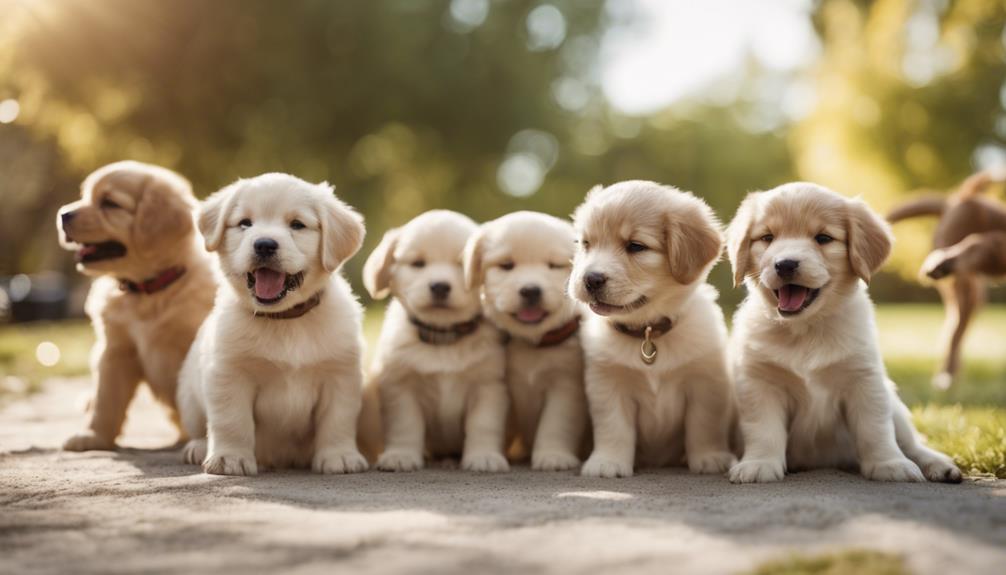Understanding the optimal timing to enroll your new dog in puppy kindergarten is a decision that can significantly impact their social development. It's not just about age but also considering your pup's individual readiness for structured socialization.
Factors such as temperament, exposure to different environments, and the benefits of early positive interactions with their peers all play a crucial role in determining when to take this important step. By carefully evaluating these elements, you can ensure your furry companion embarks on a journey towards a well-adjusted and socially adept future.
Key Takeaways
- Enroll your new dog in puppy kindergarten early for crucial socialization.
- Puppy classes teach dogs that the world is safe, shaping their lifelong behavior.
- Proper socialization in puppy kindergarten makes future training easier.
- Skipping puppy kindergarten can hinder your dog's essential learning phase.
Benefits of Early Socialization
Early socialization of puppies is crucial for their overall development and well-being, setting the foundation for positive behavior throughout their lives. Exposing puppies to various environments, people, and play styles during puppy kindergarten helps prevent timidity and fear in adult dogs.
Positive associations with different stimuli at a young age can deter aggressive behaviors later on. Through structured classes, puppies learn that the world is safe, promoting a sense of security and confidence. These early experiences also make future training more manageable and effective.
Therefore, enrolling puppies in kindergarten classes that offer diverse stimuli and socialization opportunities is essential for their long-term behavioral and emotional well-being.
Importance of Positive Associations
Exposing puppies to various stimuli and experiences in structured classes during puppy kindergarten fosters positive associations that lay the foundation for their long-term behavioral development. This positive reinforcement helps shape their attitudes and responses to different situations, leading to well-rounded and confident adult dogs.
Creating these positive associations early can prevent future behavior issues and foster a strong bond between the dog and its owner. To ensure a successful transition into adulthood, it is crucial to establish these positive associations during the critical developmental stages in puppyhood.
- Building confidence and trust in various environments.
- Strengthening the bond between the puppy and its owner.
- Promoting a positive outlook on new experiences and stimuli.
Exposure to Diverse Environments

A well-rounded puppy's development is significantly enhanced through exposure to diverse environments during puppy kindergarten classes.
Exposing puppies to a variety of environments, such as parks, streets, stores, and different surfaces, helps them become more adaptable and confident. Interacting with various people, dogs, and play styles during classes fosters positive socialization experiences that are crucial for their future behavior.
Additionally, introducing puppies to different stimuli like tunnels and obstacles can aid in building their confidence and problem-solving skills.
Training for Adaptability
Developing adaptability in puppies is a fundamental aspect of their training for a well-rounded and resilient adult dog. Puppies that are adaptable can handle new situations, environments, and challenges with ease, leading to a more confident and well-behaved pet.
To train for adaptability effectively, consider the following:
- Expose puppies to various stimuli from an early age to prevent fear or timidity.
- Introduce puppies to different surfaces, sounds, and experiences to build their confidence.
- Encourage positive associations with new environments and people through rewards and praise.
Ensuring a Safe World Perception

To instill a sense of security and confidence in puppies, it is imperative to shape their perception of the world as a safe and welcoming place through positive experiences and interactions. One effective way to achieve this is through proper socialization in environments like puppy kindergarten. Below is a table highlighting key elements to consider when ensuring a safe world perception for your puppy:
| Factors to Consider for a Safe World Perception | Description | Importance |
|---|---|---|
| Positive interactions with people and animals | Encourages trust and reduces fear | Builds confidence in the puppy |
| Exposure to various environments and stimuli | Helps normalize new experiences for the puppy | Fosters adaptability |
| Consistent positive reinforcement techniques | Reinforces good behavior and learning | Creates a positive learning environment |
| Monitoring and addressing signs of fear or anxiety | Ensures a supportive and safe learning environment | Prevents negative associations |
Timing for Enrollment
Enrollment timing for puppy kindergarten classes is crucial for maximizing socialization benefits and ensuring a positive learning experience for your new dog. To make the most of this opportunity, consider the following:
- Age: Puppies are most receptive to socialization between 3 and 14 weeks old.
- Health: Ensure your puppy is up to date on vaccinations before attending classes.
- Development: Early enrollment helps build a strong foundation for future training and social interactions.
Socialization Vs. Obedience Training

Understanding the distinction between socialization and obedience training is essential for guiding your puppy's early development. Puppy kindergarten primarily focuses on socialization, exposing puppies to various environments, people, and play styles to teach them that the world is safe.
In contrast, obedience training involves teaching commands like sit, stay, and come through positive reinforcement. While obedience training is crucial, skipping puppy kindergarten can hinder a puppy's crucial learning phase and impact their lifelong behavior.
Proper socialization at a young age makes all future training easier and helps prevent potential behavior issues. Therefore, incorporating both socialization and obedience training into your puppy's routine is vital for their overall development and well-being.
Lifelong Behavioral Impacts
Proper socialization during a puppy's early stages plays a critical role in shaping their lifelong behavioral responses and interactions. It is essential to understand the long-term impacts of early socialization on a dog's behavior.
Here are three key ways in which proper socialization can influence a dog's behavior throughout its life:
- Confidence Building: Early socialization helps puppies build confidence in various situations, reducing the likelihood of fear or aggression later on.
- Adaptability: Proper socialization teaches dogs to adapt positively to new environments, people, and stimuli, making them more resilient and adaptable in different situations.
- Social Skills: Early interactions with other dogs and people help in developing strong social skills, leading to better communication and relationships with others.
Affordable Alternatives Available

For those seeking cost-effective options for puppy socialization, there are several affordable alternatives to traditional puppy kindergarten programs. While puppy kindergarten can typically cost around $100, there are ways to achieve similar socialization benefits without breaking the bank. One option is to seek out local trainers who use positive reinforcement methods for socialization help at a lower cost. Additionally, reading puppy training books can provide guidance on creating your version of a puppy kindergarten program at home.
Introducing your puppy to new experiences and environments while using treats for positive reinforcement can also be an effective and budget-friendly way to promote socialization. By exploring these alternatives, you can still ensure your puppy receives the necessary socialization for a lifetime of enjoyable outdoor adventures.
DIY Puppy Kindergarten Tips
Creating a structured and engaging DIY puppy kindergarten program at home can effectively support your puppy's socialization and behavioral development.
- Set a Routine: Establish a consistent schedule for training, feeding, playtime, and rest to provide stability for your puppy.
- Socialization Activities: Organize playdates with other vaccinated puppies, expose your puppy to various environments, and introduce them to different people to enhance socialization skills.
- Positive Reinforcement Training: Use treats, toys, and praise to reward good behavior and encourage learning in a positive and reinforcing manner.
Early Socialization for Outdoor Enjoyment

Commencing early socialization efforts is paramount for fostering a puppy's comfort and enjoyment in outdoor settings. Exposing puppies to various environments, sounds, and experiences from a young age helps them grow into well-adjusted adult dogs.
Outdoor socialization is crucial for teaching puppies how to interact with other animals, people, and navigate different terrains confidently. Positive encounters during this early phase can prevent fear or aggression issues later in life and contribute to a lifetime of enjoyable outdoor adventures.
Conclusion
In conclusion, timely enrollment in puppy kindergarten is crucial for shaping a dog's behavior and preventing future behavioral issues.
By prioritizing socialization over commands, owners can establish positive associations with the world and ensure their furry companions lead fulfilling lives.
Exploring affordable alternatives or DIY tips can help bridge the gap for those facing cost or availability challenges.
Early socialization sets the foundation for a well-adjusted and adaptable dog prepared for a lifetime of positive interactions.




